Related Research Articles

Sheepshead is an American trick-taking card game derived from Bavaria's national card game, Schafkopf, hence it is sometimes called American Schafkopf. Sheepshead is most commonly played by five players, but variants exist to allow for two to eight players. There are also many other variants to the game rules, and many slang terms used with the game.

Whist is a classic English trick-taking card game which was widely played in the 18th and 19th centuries. Although the rules are simple, there is scope for strategic play.
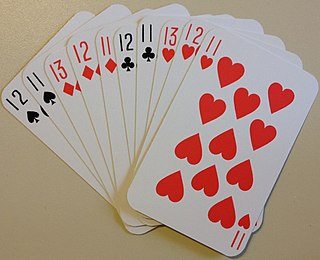
500 or Five Hundred is a trick-taking game developed in the United States from Euchre. Euchre was extended to a 10 card game with bidding and a Misere contract similar to Russian Preference, producing a good cut-throat three player game like Preference and a four player game played in partnerships like Whist which is the most popular modern form, although with special packs it can be played by up to six players.

Euchre or eucre is a trick-taking card game commonly played in Australia, Canada, Great Britain, New Zealand, and the Midwestern United States. It is played with a deck of 24, 28, or 32 standard playing cards. There are normally four players, two on each team, although there are variations for two to nine players.

Ombre or l'Hombre is a fast-moving seventeenth-century trick-taking card game for three players and "the most successful card game ever invented."

Napoléon "Nap" Lajoie, also known as Larry Lajoie and nicknamed "the Frenchman", was an American professional baseball second baseman and player-manager. He played in Major League Baseball (MLB) for the Philadelphia Phillies, Philadelphia Athletics (twice), and Cleveland Naps between 1896 and 1916. He managed the Naps from 1905 through 1909.
Marjapussi is a traditional Finnish trick taking game for 4 players playing in 2 partnerships and is one of the Mariage family, its key feature being that the trump suit is determined in the middle of the play by declaring a marriage. There are variants of Marjapussi for two and three players.

Bid whist is a partnership trick-taking variant of the classic card game whist. As indicated by the name, bid whist adds a bidding element to the game that is not present in classic whist. Bid whist, along with spades, remains popular particularly in U.S. military culture and a tradition in African-American culture.

Snip-Snap-Snorum, or Snip-Snap-Snorem, is a matching-type card game, mostly played by children, and has several variants. The game dates to at least the 18th century, and probably derives from a more ancient drinking and gambling game. References to "Snip, snap, snorum", which seems to be the original spelling, go back to at least 1755.

Polignac is a French 18th century trick-taking card game ancestral to Hearts and Black Maria. It is played by 3-6 players with a 32-card deck. It is sometimes played as a party game with the 52-card pack; however, it is better as a serious game for four, playing all against all. Other names for this game include Quatre Valets and Stay Away. Knaves is a variant and it is also similar to the Austrian and German games, Slobberhannes, Eichelobern and Grasobern.

Twenty-five is the Irish national card game, which also underlies the Canadian game of Forty-fives. Charles Cotton describes its ancestor in 1674 as "Five Cards", and gives the nickname five fingers to the Five of Trumps extracted from the fact that the Irish word cúig means both 'five' and 'trick'. It is supposed to be of great antiquity, and widely believed to have originated in Ireland, although "its venerable ancestor", Maw, of which James I of England was very fond, is a Scottish game.
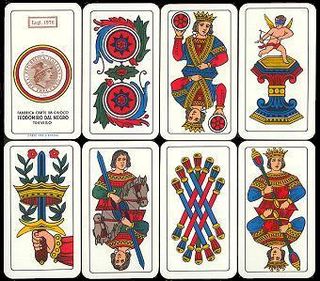
Calabresella, Calabragh, sometimes spelt Calabrasella, "the little Calabrian game", also known as Terziglio, is an Italian trick-taking card game variation of Tressette for three players, but it can be played by four with the dealer receiving no cards for the hand. One of the earliest references of the game dates from 1822.
3-5-8, also known as Sergeant Major for its popularity among members of the Royal Air Force, is a trick-taking card game for 3 players, using a standard 52 card deck. 3-5-8 may be played as a gambling game, and there are many variations with names like "8-5-3" and "9-5-2" played throughout the world.

Napoleon or Nap is a straightforward trick-taking game in which players receive five cards each and whoever bids the highest number of tricks chooses trumps and tries to win at least that number of tricks. It is often described as a simplified version of Euchre, although David Parlett believes it is more like "an elaboration of Rams". It has many variations throughout Northern Europe, such as Fipsen. The game has been popular in England for many years, and has given the language a slang expression, "to go nap", meaning to take five of anything. It may be less popular now than it was, but it is still played in some parts of southern England and in Strathclyde. Despite its title and allusions, it is not recorded before the last third of the nineteenth century, and may have been first named after Napoleon III.
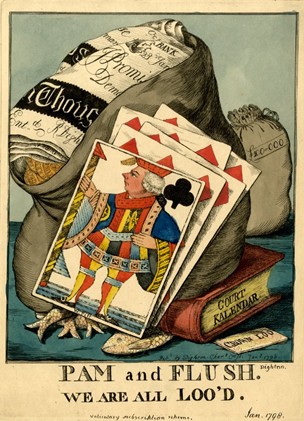
Lanterloo or Loo is a 17th-century trick taking game of the trump family of which many varieties are recorded. It belongs to a line of card games whose members include Nap, Euchre, Rams, Hombre, and Maw. It is considered a modification of the game of "All Fours", another English game possibly of Dutch origin, in which the players replenish their hands after each round by drawing each fresh new cards from the pack.

Bostogné, Boston or Boston Whist is an 18th-century trick-taking card game played throughout the Western world apart from Britain, forming an evolutionary link between Hombre and Solo Whist. Apparently named after a key location in the American War of Independence, it is probably a French game which was devised in France in the 1770s, combining the 52-card pack and logical ranking system of partnership Whist with a range of solo and alliance bids borrowed from Quadrille. Other lines of descent and hybridization produced the games of Twenty-five, Préférence and Skat. Its most common form is known as Boston de Fontainebleau or French Boston.

Rams is a European trick-taking card game related to Nap and Loo, and may be played by any number of persons not exceeding nine, although five or seven make a good game. In Belgium and France, the game of Rams is also spelt Rammes or Rems, in Germany, Rams, Rammes, Ramsch, Ramschen, Ramscheln or Ramsen, in Austria, Ramsen and Ramschen, and, in America, Rounce. The basic idea is fairly constant, but scoring systems vary. It was a widespread European gambling and drinking game that is still popular today. During the 19th century, it was introduced as Rounce in America and played with a 52-card deck without any difference between simples and doubles and with no General Rounce announcement. In the modern German variety of the game, Ramscheln, the 7♦ is the second best trump ranking next below the ace.
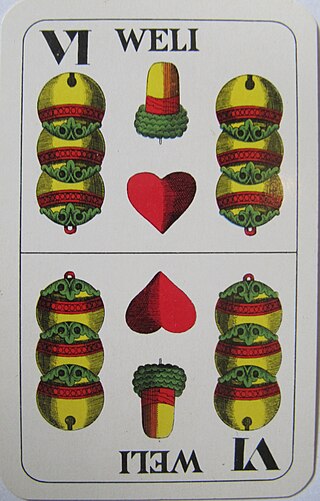
Mauscheln, also Maus or Vierblatt, is a gambling card game that resembles Tippen, which is commonly played in Germany and the countries of the old Austro-Hungarian Empire.
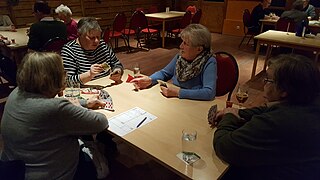
Fipsen or Fips is an old north German card game for 4 or 5 players that resembles British Nap in some respects. It is a trick-taking game played with a standard Skat pack that was once popular across North Germany in the former states of Schleswig, Holstein, Mecklenburg and Pomerania, but is now restricted to the south Holstein region. In the village of Thedinghausen in Lower Saxony, a rather different game is played under the same name for currant buns called Hedewigs. It has been described as "quite a special card game" that is "ancient, but very easy to learn".

Skærvindsel is a Danish card game for four players that is a member of the Schafkopf family. Today it is mostly played in Jutland and is therefore often spelled Sjervinsel, but was previously widespread throughout Denmark. It was the first Danish game where the winner of the auction, the declarer, could choose a partner by calling an Ace. This principle has since been transferred to Call-Ace Whist (Esmakkerwhist).
References
- ↑ Soanes and Stevenson (2005), p. 1168.
- ↑ Frequency of Use of the Term "Go Nap" Over Time at educalingo.com. Retrieved 20 December 2022.
- ↑ Nap at dictionary.reverso.net. Retrieved 20 December 2022.
- ↑ Goals Aplenty in Junior Cup Ties. at suffolkfa.com. Retrieved 20 December 2022.
- ↑ Herdman (1903). Extract from Parliamentary Debates: House of Representatives. Wellington: New Zealand Government. p. 627.